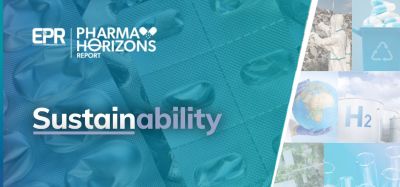New study: ‘The Corporate Reputation of Pharma in 2014 – the Patient Perspective’
Posted: 13 February 2015 |
An independent study by PatientView…


An new independent study by PatientView ‘The Corporate Reputation of Pharma in 2014 – the Patient Perspective’, sets out the the corporate reputation of pharma companies from a patient perspective, and details what has changed over the past four years. In summary:
- Findings based on a survey of 1,150 patient groups (from 58 countries and of differing specialties)
- Survey conducted mid-November 2014 to mid-January 2015
- Patient-group feedback on the corporate reputation of the entire pharma industry during 2014
- Patient-group feedback on the corporate reputation of 37 individual pharma companies in 2014
- Results for 2014 are compared with those of 2013, 2012, and 2011
The 37 pharma companies reviewed in the study are: AbbVie l Actavis l Allergan l Amgen l Astellas l AstraZeneca l Baxter International l Bayer l Biogen Idec l Boehringer-Ingelheim l Bristol-Myers Squibb l Celgene l Eisai l Eli Lilly (Lilly) l Gilead l GlaxoSmithKline (GSK) l Grũnenthal l Ipsen l Janssen l Lundbeck l Menarini l Merck & Co (USA) l Merck KgA (Germany) l Mylan l Novartis l Novo Nordisk l Otsuka l Pfizer l Roche l Sanofi l Servier l Shire l Stada Arzneimittel l Takeda l Teva l UCB l ViiV Healthcare
Results for individual pharma companies
The corporate reputation of individual pharma companies (as seen from a patient perspective) shows some significant changes between 2014 and 2013 (37 companies assessed in 2014; 33 companies in 2013).
Top 10 pharma
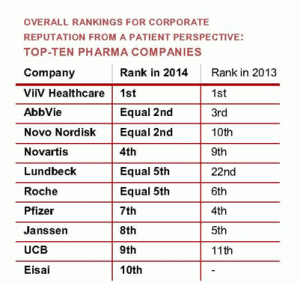

ViiV Healthcare continues to rank 1st in 2014, as it did in 2013. AbbVie gives a strong performance, standing equal-2nd in 2014 out of 37 companies for corporate reputation from a patient perspective. AbbVie also ranks first for integrity in 2014. Novo Nordisk jumps 8 places in the rankings, from 10th in 2013 to equal-2nd in 2014. The company was dragged down in previous years, possibly because of its decision to stop selling medicines to Greece back in 2010. In 2014, Novo Nordisk has moved past these difficulties to rank first for transparency. Novartis rises 5 places in the rankings, from 9th in 2013 to 4th in 2014. The increase is partly due to the fact that patient groups rank Novartis 3rd in 2014 for providing high-quality products useful to patients.
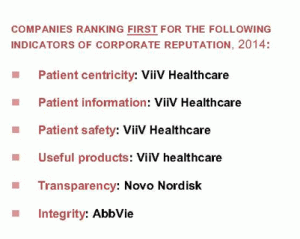

Lundbeck (after slumping to 22nd in 2013—almost certainly because patient groups reacted to the June 2013 news that the company had been fined by the European Commission) has managed to move back up the rankings in 2014 to 5th. In fact, mental-health patient groups vote Lundbeck 1st for corporate reputation in 2014 out of 12 other pharma companies with mental-health products (separate mental-health analysis to be published by PatientView later in February 2015). Roche rises one place overall in the rankings, from 6th in 2013 to equal-5th in 2014. Roche increases its reputation for producing high-quality products useful to patients, ranking 4th for this indicator in 2014 (up from 10th in 2013). Pfizer remains in the top ten at 7th place. Janssen ranks 8th in 2014. Janssen improves its reputation for acting with integrity, rising four places for this indicator in 2014. UCB rises 3 places overall. The company performs best at providing high-quality information to patients (ranking 8th for this indicator in 2014, compared with 13th in 2013). Eisai appears in 2014 for the first time in the annual Corporate Reputation study, coming 10th overall—and ranks 6th for producing high-quality products useful to patients. One of the reasons for the vote of confidence for Eisai by patient groups may be the FDA’s 2014 approval for the company’s Akynzeo, a combination treatment to prevent nausea and vomiting among cancer patients undergoing chemotherapy. Eisai is also known to be working on new drugs for Alzheimer’s disease.
Other shifts in the pharma universe …
Biogen Idec rises from overall-31st position in 2013 to 19th in 2014. Gilead falls 12 places from its 2013 rank of 2nd to 14th in 2014—most likely due to its controversial pricing strategy for its new hepatitis-C drugs. Activists worldwide have held public demonstrations to oppose Gilead’s pricing decisions for the treatments. AstraZeneca’s fall in the rankings from 17th in 2013 to 24th in 2014 may be the result of it having experienced a turbulent 2014—not least, surviving an attempted takeover by Pfizer. Lilly ranks 12th overall in 2014, down from 7th in 2013. Bayer rises four places for patient-centredness, to 17th out of 37 companies in 2014. GSK rises six places for having a good record on patient safety, to 9th in 2014. BMS, too, rises for having a good record on patient safety, up four places to 22nd in 2014. Merck & Co (the US company) rises for providing high-quality information to patients, up three places to 17th in 2014. Sanofi rises for having high-quality products useful to patients, up five places to 13th in 2014. Teva rises for having a good record on patient safety, up five places to 16th in 2014.
Pharma industry-wide rankings
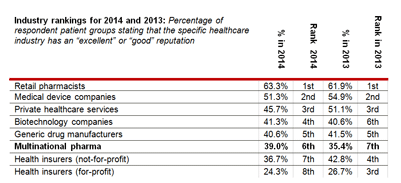

The corporate reputation of the whole pharma industry improves in 2014—at the expense of the health-insurance industry, but still remains lower than that of retail pharmacists and medical-device companies
The multinational pharma industry in 2014 ranks 6th among 8 healthcare-industry sectors. 39% of the 1,150 patient groups respondent in 2014 say that pharma has either an “excellent” or a “good” corporate reputation in 2014 (compared with 35.4% which said the same in 2013, when pharma ranked 7th out of 8 healthcare industries). The step up the rankings for pharma is primarily due to a decline in the corporate reputation of both the not-for-profit and the for-profit health-insurance sectors, which rank 7th and 8th respectively in 2014.
While the corporate reputation of the whole pharma industry improved in 2014, it is still not restored to that of a peak level of 2011 (and, even in 2011, the reputation of pharma was below that of most other healthcare-industry sectors)
In 2014, 25.1% of respondent patient groups see the pharma industry’s reputation as improved over the past five years. 19.9% of 2013’s respondent patient groups said the same. The percentage at pharma’s peak, in 2011, was 29%—an unimpressive figure.
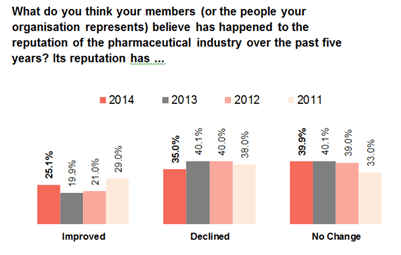

The majority of patient groups respondent in 2014 acknowledge (as “excellent” or “good”) pharma’s innovative capabilities, and its ability to ensure patient safety. However, the majority of patient groups do not believe that the industry is “excellent” or “good” in its other activities. These further activities are:
- Having a good relationship with the media
- Providing high-quality information for patients
- Providing access to clinical trials / Having a patient-centred strategy
- Acting with integrity
- Managing adverse news about products
- Having ethical marketing practices
- Providing services to patients outside its business remit
- Being transparent in all corporate activities
- Practising philanthropic activities
- Fair pricing policies






